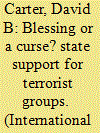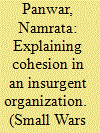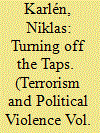| Srl | Item |
| 1 |
ID:
112134


|
|
|
|
|
| Publication |
2012.
|
| Summary/Abstract |
Little existing work has systematically examined the factors that help terrorist groups survive or contribute to their failure. State support for terrorist groups is commonly thought to be a factor that helps groups to survive. I demonstrate with newly collected data that state sponsorship is not always helpful to terrorist groups. The resources provided by sponsors increase a group's ability to maintain itself internally. However, when a group has a sponsor that provides it with safe haven, the risk of the group being forcefully eliminated by the target increases. I argue that sponsors that provide safe haven can have incentives to provide information to the target about the groups to avoid potential costs from target military operations within their territory. The key empirical findings suggest that state sponsorship is a less serious problem for target states than many previously thought.
|
|
|
|
|
|
|
|
|
|
|
|
|
|
|
|
| 2 |
ID:
158960


|
|
|
|
|
| Summary/Abstract |
Despite the prevalence of violent uprisings against the states, existing literature has produced a generalized explanation of the causes and onset of such uprisings ignoring crucial aspects of (non-state) armed group cohesion, such as their capabilities to manage intra-group tensions and rivalries. In this paper, I examine recent research in the field of civil conflict to understand the importance of investigating underlying constraints which can cause serious impediments to the capabilities of a state during the course of a war. The paper then focuses on the importance of internal strategic resources, such as pre-war and wartime sociopolitical networks in which insurgents mobilize, recruit new cadres and maintain intra-group cooperation, to suggest how it can contain the consequences of counterinsurgency operations and other state strategies on the internal cohesion of an insurgent group. A detailed case study of the Mizo National Front (MNF) in India demonstrates the argument’s plausibility.
|
|
|
|
|
|
|
|
|
|
|
|
|
|
|
|
| 3 |
ID:
138787


|
|
|
| 4 |
ID:
078493


|
|
|
|
|
| Publication |
2007.
|
| Summary/Abstract |
Four years after the fall of Saddam Hussein, many scholars and policy makers concluded that an alliance between Iraq and al Qaeda did not exist. Yet the absence of this alliance raises a puzzle: Given their mutual interest in opposing U.S. hegemony in the Middle East, why wasn't there an alliance between Saddam Hussein and Osama bin Laden? In this essay, we develop an explanation for why Iraq and al Qaeda did not ally using previous scholarly work on bargaining and alliances. Our explanation concludes that Iraq and al Qaeda failed to form an alliance due to mutual fears of opportunism and the problem of credible commitment. We conclude by presenting evidence for our explanation and offering a policy prescription for governments facing threats of state sponsored terrorism.
|
|
|
|
|
|
|
|
|
|
|
|
|
|
|
|
| 5 |
ID:
106615


|
|
|
|
|
| Publication |
2011.
|
| Summary/Abstract |
This article explores the consequences for the funding of Islamist terrorist groups of nationalization, in the form of state sponsorship, versus privatization, in the form of autonomous financing. The article begins by examining the evolution in terrorist groups' sources of funding from state sponsorship to autonomous activity, then turns to the benefits and costs to terrorist groups of relying on state sponsors. The article then analyzes the benefits and costs of procuring funding autonomously. Finally, the article weighs those benefits and costs in relation to a terrorist group's emphasis on enhancing its constituency versus pursuing its agenda. The article's central conclusion is that nationalization tends to boost a terrorist group's constituency while privatization tends to bolster a group's agenda. Determining which advantage takes priority depends on the relative importance to a given terrorist group at a particular time of enhancing its constituency versus advancing its agenda.
|
|
|
|
|
|
|
|
|
|
|
|
|
|
|
|
| 6 |
ID:
169909


|
|
|
|
|
| Summary/Abstract |
Why do some states terminate their sponsorship of rebel movements while others are persistent in their provision of support? In the past, most research on external support to insurgents has focused on why states choose to sponsor rebel groups and particularly how this affects conflict duration. However, we know little about the termination of such support. This is surprising given that support has been shown to make armed conflicts more intractable and tremendous efforts are made in condemning and sanctioning such behavior. This study constitutes the first large-N analysis of support termination, employing survival analysis on global data of state support to rebel movements between 1975–2009. Surprisingly, the findings indicate that only some of the factors that explain support provision can offer insights into its termination. In particular, support is more likely to be terminated when no ethnic kinship bonds exist between the rebel movement and the government of the supporting state. Many decisions to withdraw support also seem to coincide with the transition from the Cold War. Threats and sanctions from other states appear largely ineffective. The study contributes to our understanding of the international dimensions of civil war and the role and motives of third parties.
|
|
|
|
|
|
|
|
|
|
|
|
|
|
|
|